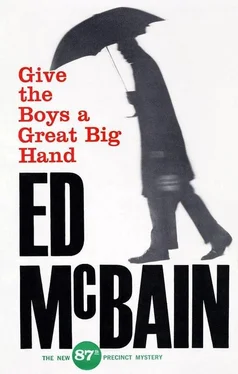Here could be seen the hip musicians with the dizzy kicks and the tenor sax cases and the trombone cases discussing openings on various bands, some of them passing around sticks of marijuana, others lost in the religion that was music and needing no outside stimulation. Here, too, were the long-haired classicists carrying oboe cases, wearing soft felt hats, discussing the season in Boston or Dallas, and wondering whether Bernstein would make it at the Philharmonic. Here were the women singers, the canaries, the thrushes whose grins were as trained as their voices, who — no matter how minuscule the band they sang with — entered the arcade like Hollywood movie queens.
Here were the ballet dancers and the modern dancers, wearing short black skirts that permitted freer movement, their high heels clicking on the marble floor, walking with that peculiar duck waddle that seems to be the stamp of all professional dancers. Here were the strippers, the big pale women untouched by the sun, wearing dark glasses and lipstick slashes. Here were the publishers, puffing on cigars and looking like the Russian concept of the American capitalist. And here were the unsuccessful composers, needing haircuts, and here were the slightly successful composers carrying demo records, and here were the really successful composers who sang badly and who played piano more badly but who walked with the cool assurance of jukebox loot spilling out of their ears.
Upstairs, everybody was rehearsing, rehearsing with small combos and big bands, rehearsing with pianos, rehearsing with drums, rehearsing dances and symphonies and improvised jam sessions. The only thing that wasn’t rehearsed in the Creo Building was the dialogue going on in the lobby and before the entrance doors.
The dialogue of Charles Tudor may or may not have been rehearsed, it was difficult to tell. His small office was on the eighteenth floor of the building. Two tall, pale, buxom girls carrying hatboxes were sitting on a wooden bench in the waiting room. A short, rosy-cheeked, flat-chested girl was sitting behind a desk at the far end of the room. Carella went to her, flashed the tin, and said, “We’re from the police. We’d like to talk to Mr. Tudor, please.”
The receptionist studied first Hawes, then Carella. The two pale strippers on the bench turned a few shades paler. The taller of the two rose abruptly, picked up her hatbox, and hastily departed. The second busied herself with a copy of Variety.
“What’s this in reference to?” the receptionist asked.
“We’ll discuss that with Mr. Tudor,” Carella said. “Would you mind telling him we’re here?”
The girl pulled a face and pressed a stud in the phone on her desk. “Mr. Tudor,” she said into the mouthpiece, “there are a couple of gentlemen here who claim to be detectives. Well, they said they’d discuss that with you, Mr. Tudor. I couldn’t say, I’ve never met a detective before. Yes, he showed me a badge. Yes, sir.” She hung up.
“You’ll have to wait a minute. He’s got somebody with him.”
“Thank you,” Carella said.
They stood near the desk and looked around the small waiting room. The second stripper sat motionless behind her Variety, not even daring to turn the page. The walls of the room were covered with black-and-white photos of strippers in various provocative poses. Each of the photographs was signed. Most of them started with the words “To Charlie, who... ” and ended with exotic names like Flame or Torch or Maja or Exota or Bali. Hawes walked around the room looking at the photos. The girl behind the copy of Variety followed him with her eyes.
Finally, in a very tiny voice that seemed even smaller issuing from such a big woman, she said, “That’s me.”
Hawes turned. “Huh?” he asked.
“With the furs. The picture you were looking at. It’s me.”
“Oh. Oh,” Hawes said. He turned to look at the picture again. Turning back to the girl, he said, “I didn’t recognize you with your... ” and then stopped and grinned.
The girl shrugged.
“Marla? Is that your name? The handwriting isn’t too clear.”
“Marla, that’s it,” she said. “It’s really Mary Lou, but my first agent changed it to Marla. That sounds exotic, don’t you think?”
“Yes, yes, very,” Hawes agreed.
“What’s your name?”
“Hawes.”
“That’s all?”
“Well, no. Cotton is my first name. Cotton Hawes.”
The girl stared at him for a moment. Then she asked, “Are you a stripper, too?” and burst out laughing. “Excuse me,” she said, “but you have to admit that’s a pretty exotic name.”
“I guess so,” Hawes said, grinning.
“Is Mr. Tudor in some trouble?” Marla asked.
“No.” Hawes shook his head. “No trouble.”
“Then why do you want to see him?”
“Why do you want to see him?” Hawes asked.
“To get a booking.”
“Good luck,” Hawes said.
“Thank you. He’s a good agent. He handles a lot of exotic dancers. I’m sure he’ll get me something.”
“Good,” Hawes said. “I hope so.”
The girl nodded and was silent for a while. She picked up the copy of Variety , thumbed through it, and then put it down again. “You still haven’t told me why you want to see Mr. Tudor,” she said, and at that moment the door to the inner office opened and a statuesque brunette wearing heels that made her four inches taller stepped into the waiting room, bust first.
“Thanks a lot, Charlie,” she yelled, almost colliding with Carella to whom she hastily said, “Oh, pardon me, dearie,” and then clattered out of the room.
The phone on the receptionist’s desk buzzed. She lifted the receiver. “Yes, Mr. Tudor,” she said, and then hung up. “Mr. Tudor will see you now,” she said to Carella.
“Good luck,” Marla said to Hawes as he moved past the bench.
“Thank you,” Hawes said. “The same to you.”
“If I ever need a cop or something,” she called after him, “I’ll give you a ring.”
“Do that,” Hawes said, and he followed Carella into Tudor’s office. The office was decorated with more photographs of exotic dancers, so many photographs that both Tudor and his desk were almost lost in the display. Tudor was a huge man in his late forties wearing a dark-brown suit and a pale-gold tie. He possessed a headful of short black hair that was turning white at the temples, and a black Ernie Kovacs mustache. He was smoking a cigarette in a gold-and-black cigarette holder. He gestured the detectives to chairs, and a diamond pinky ring glistened on his right hand.
“I understand you’re policemen,” he said. “Does this have anything to do with Barbara?”
“Yes, sir,” Carella said. “We understand that you were the gentleman who reported Miss Caesar missing.”
“Yes,” Tudor said. “You must forgive my rudeness when my receptionist announced you. I sometimes get calls from policemen that have nothing whatever to do with... well, something as serious as Barbara.”
“What kind of calls, Mr. Tudor?” Hawes asked.
“Oh, you know. A show is closed down someplace, and some of my girls are in it, and immediately the police make an association. I only find employment for these girls. I don’t tell them how to observe the rules of propriety.” Tudor shrugged. His speech was curious in that it was absolutely phony. He spoke with the clipped precision of an Englishman, and one received the impression that he chose his words carefully before allowing them to leave his mouth. But the elegant tones and rounded vowels were delivered in the harshest, most blatant city accent Carella had ever heard. And the odd part was that Tudor didn’t seem at all aware of the accent that stamped him as a native of either Isola or Calm’s Point. Blithely, he clipped his words immaculately and seemed under the impression that he was a member of the House of Lords delivering a speech to his fellow peers.
Читать дальше





![Ричард Деминг - Whistle Past the Graveyard [= Give the Girl a Gun]](/books/412176/richard-deming-whistle-past-the-graveyard-give-t-thumb.webp)






